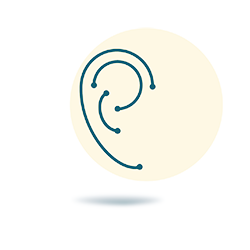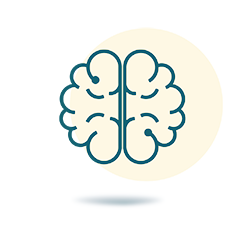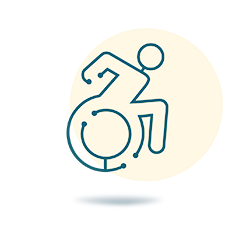Mada Assistive Technology Portal is the first digital platform specialized in assistive technology in Arabic. The portal provides a wide range of information, resources and assistive technology services to enable and support the independence of persons with disabilities through accessible information and communication technology ICT.
Assistive Technology by Body Function
Assistive technology provides a wide range of solutions for people who have disabilities and functional limitations in human senses such as vision, hearing, communication, mobility and cognition, to improve their functional abilities.

Sensory – Hearing
Assistive technology for persons with hearing impairment either amplifies sound or converts it into visual or tactile signals.
These products are designed to assist deaf and hard-of-hearing people who need help with communication, access to media, and awareness of the sounds around them.

Sensory – Vision
Assistive technology for persons with visual impairment supports visual stimuli such as the sense of shape, size and color.
Individuals who may benefit from this technology include blind persons, persons with low vision, or with conditions limiting their ability to recognize visual stimuli.

Voice and Speech
Assistive technology for verbal communication, also known as augmentative and alternative communication (AAC) devices, help people with speech difficulties communicate verbally or face to face.

Mental – Cognitive
Assistive technology for persons with cognitive limitations supports mental functions such as memory, language, calculation, and organization.

Neuromusculoskeletal Movement
Assistive technology for persons with limited functions of joints, bones, reflexes and muscles supports their movement, access and mobility
Assistive Technology by Activities and Participation
Assistive technology provides a wide range of solutions for people with disabilities to support their independence and participation in various tasks and activities in their life areas such as education, employment and society.
![]()
Mobility and Transportation
Assistive technology for mobility and transportation help persons with limitations for moving around or transferring from one place to another.
![]()
Self-care
Assistive technology for self-care helps individuals complete everyday essential activities such as dressing, bathing, eating, cleaning, or meal preparation.
![]()
Recreation and Leisure
Assistive technology for recreation and leisure provides accessible solutions to participate in and enjoy leisure activities such as gaming, listening to audio content, or watching TV.
![]()
Communication
Assistive technology for communication assists people communicating in multiple ways such as verbal, text, video, signs and symbols.
![]()
Education
Assistive technology for education enables students to engage in inclusive learning environments and enhance opportunities for lifelong learning.
![]()
Employment
Assistive technology for employment enables persons with disabilities to engage in work and jobs to improve their accessibility, productivity, and independence.
![]()
Interpersonal interactions and relationships
Assistive technology for interpersonal interactions and relationships assists managing person’s emotion, social, and behavior to increase appropriate social interactions and participations.
![]()
Environmental Control
Assistive technology for environmental control assists persons to facilitate manipulation and operation of various devices in the home, workplace, and in public.
Success Stories
Meet Hamad
12-year-old Hamad was diagnosed with Cerebral Palsy, a condition that limits his mobility. Simple tasks like studying, moving, and gaming with friends were highly challenging.
We at Mada offered Hamad various assistive technologies that facilitated his day-to-day tasks. Hamad today dreams of becoming the first Qatari to start a YouTube gaming channel.
Meet Saoud
Saoud is a young adult in a wheelchair who has Cerebral Palsy. Saoud is a highly motivated and committed individual with excellent people skills and a genuine interest in helping others.
He joined the Access to Employment Program offered by Mada in 2018 and is working now as a receptionist at Um Salal Primary School. Saoud uses Arabic BigKeys with a keyguard and a joystick mouse to access the computer and perform his daily tasks.
